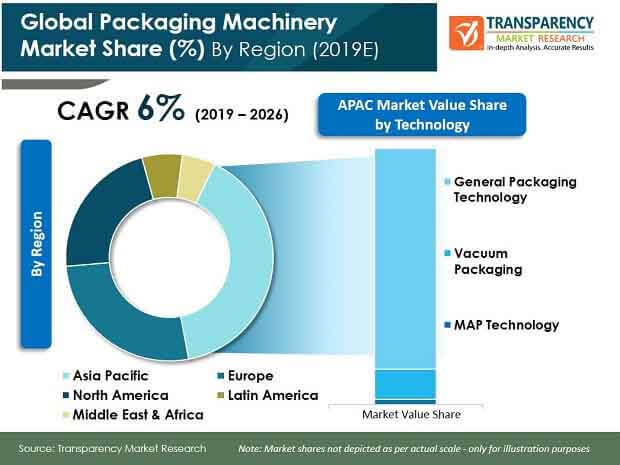
Packaging Machinery Market: Introduction
Transparency Market Research delivers key insights for the packaging machinery market in its published report, which include global industry analysis, size, share, growth, trends, and forecast for 2019–2026. In terms of revenue, the global packaging machinery market is projected to expand at a CAGR of ~6%, in terms of volume, during the forecast period, due to several factors, about which TMR offers detailed insights and forecast in packaging machinery market report.
The global packaging machinery market is fragmented. With over a hundred players present in the market. However, most of the key manufacturers have their base in five major countries including Germany, Italy, China, the U.S., and Japan. Manufacturers present in markets in Germany and Italy market offer very high quality and technologically advanced packaging machinery as compared to those offered by manufacturers in other countries. However, the packaging machinery offered by manufacturers in the European region is higher in cost as compared to their counterparts based in the Asia Pacific region such as India and China.
Around 60%-70% of the end user companies in the Asia Pacific are small-scale enterprises, which cannot afford to import expensive packaging machinery from the developed countries. However, TMR’s study also found that some of the companies in this region are not willing to compromise on quality over price. Increased consumption of packaged food products & beverages is expected to be the key dynamic force strengthening the growth of the global packaging machinery market. Overall, the global outlook of packaging machinery market is expected to remain positive during the forecast period.

Download Brochure With Latest Advancements and Application @ https://www.transparencymarketresearch.com/sample/sample.php?flag=S&rep_id=3076
High Demand for Packaging Machinery from Food & Beverages Sector to Propel Market
Food & beverages industry is the single largest manufacturing sector in terms of value addition and job creation in most of the economies growing at phenomenal rate. Worldwide sales of processed and packaged food have increased substantially over the last decade. This is majorly attributable to the factor to population growth in developing economies in the Asia-Pacific, Latin America, and the MEA. The packaging machinery market is expected to witness substantial growth on the back of the rising popularity of on-the-go and packaged food products in developed as well as developing economies.
Asia Pacific is expected to witness the highest growth in its GDP and middle-class households, driven by strong export orientation and manufacturing capabilities in China and India. Increasing private consumption is also anticipated to boost the demand for food service disposables in the region, which is expected to create a high-demand for packaging machinery in export-led economies. Consumer expenditure on food & beverages was estimated to be 8.5% of the global GDP in 2018. Moreover, consumer expenditure in the MEA and Asia Pacific is estimated to increase from 53% of the global expenditure to more than 60% in 2030, on the account of rise in disposable incomes of the middle class families in these regions.
Machinery Automation to Create Lucrative Opportunities
Integration of different systems into one is the latest trend observed in the packaging machinery market. Companies strive to offer smart maintenance services along with high optimization of packaging processes in their product lines. With the introduction of end-to-end information exchange systems in the product lines, the production efficiency has improved significantly with the reduction in complexities of the production processes. Crosslinking of automation, IT, and IOT in the production lines is anticipated to simplify inventory management for different machine components. Manufacturing companies are increasingly automating their production processes while reducing the number of workers on a production line.





